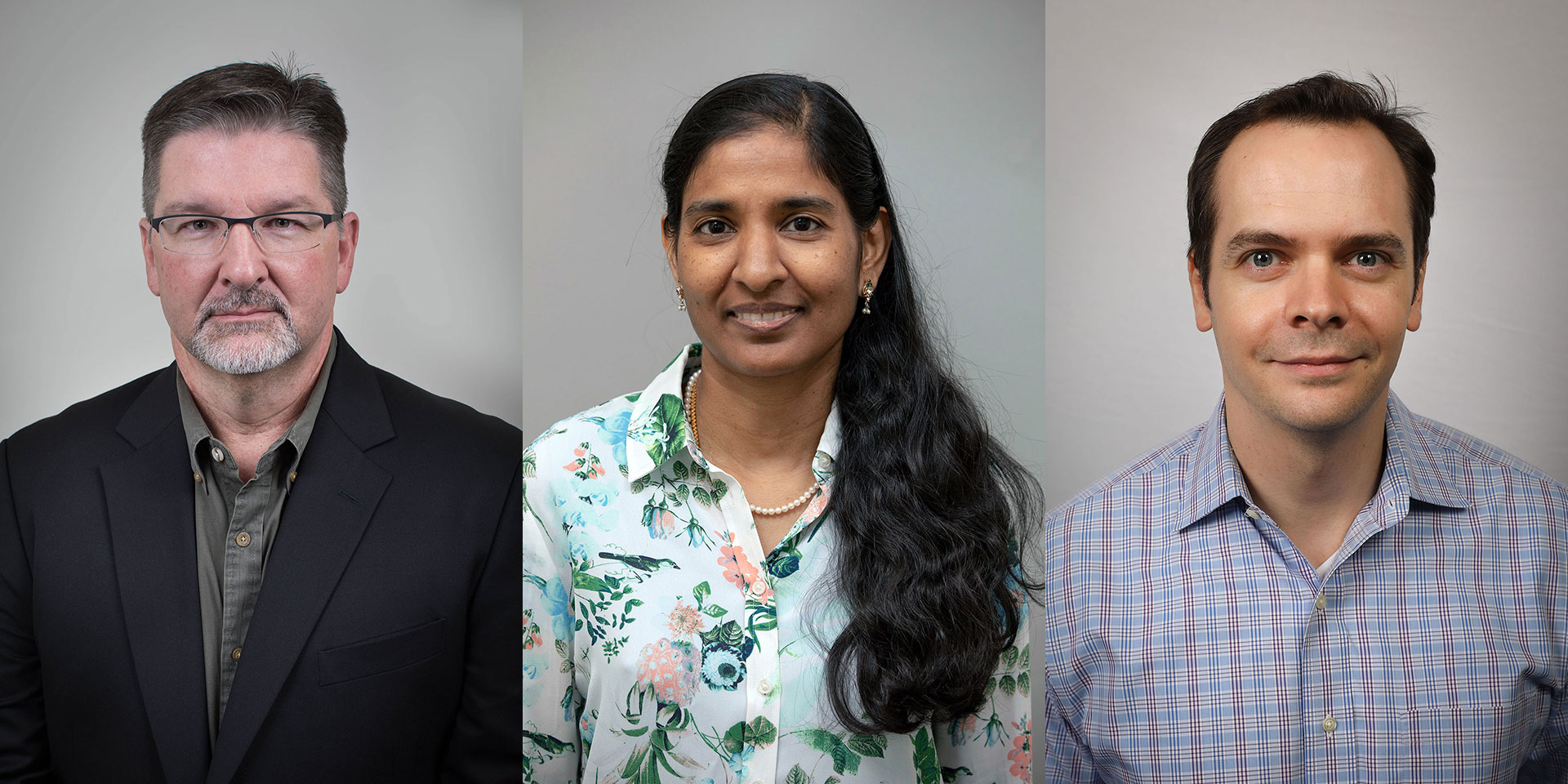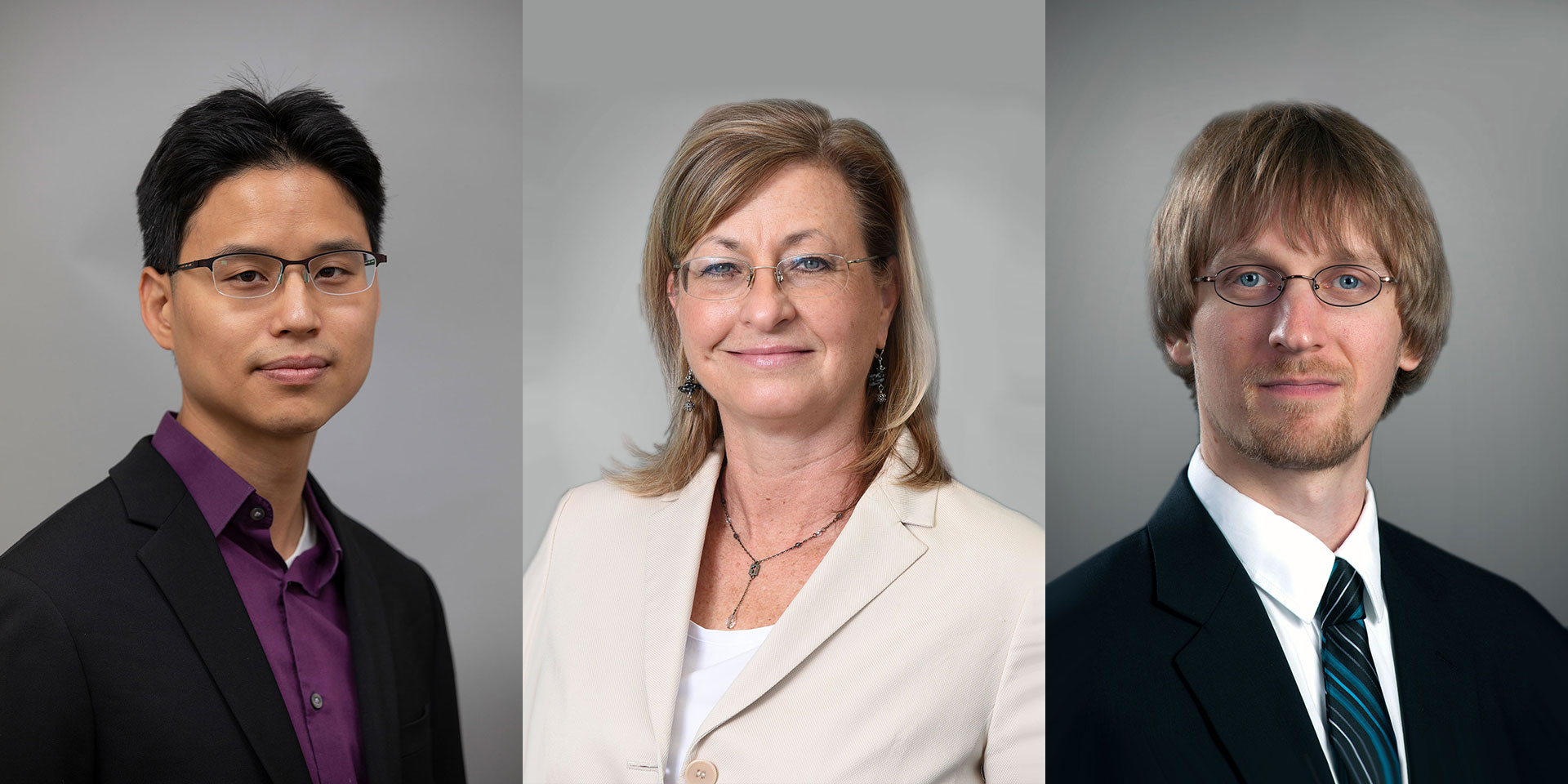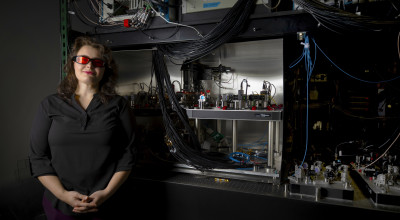“It is the supreme art of the teacher to awaken joy in creative expression and knowledge.” Albert Einstein
Educators serve a critical role around the globe – shaping the minds of generations and impacting the lives of future leaders and change agents. It’s a responsibility that we hold high at Georgia Tech and within GTRI.
In honor of Teacher Appreciation Week, we surveyed six teachers from across GTRI – James Cannady (ICL), T. Robert Harris (EOSL), Margaret Loper (ICL), Meenatchi Maran (ACCT), Christopher Valenta (EOSL), and Benjamin Yang (EOSL) – to explore what drives a teacher to teach.
How long have you been teaching and what motivates you to teach?
Cannady: I’ve spent 19 years teaching at multiple universities, the last two years have been at Georgia Tech, and what keeps me motivated are those moments when you can tell that the students finally get it. When the pieces fall into place, then you can see they are able to understand how all of the concepts discussed in class can be applied to solve real-world problems.
Harris: I’ve realized, over these five years of teaching, that we can each have an impact not only through advancing the boundaries of scientific knowledge through technical work, but also by enabling others to do so by bringing them up to that level. I love seeing the connection of understanding when bridging someone who "doesn't get it" to suddenly "getting it."
Loper: I started teaching academic courses in 2002, just before I finished my Ph.D. Then I created three professional education courses as a way to focus my teaching on modeling and simulation. While I have taught a variety of topics, I really enjoy the simulation courses as it gives me the opportunity to share my passion with students, and introduce them to the history, foundations, and application of a technology that is fundamental to how scientists and engineers solve problems.
Maran: I’ve taught my native language Tamil for four years at the Marietta Tamil School. What motivates me is working with children and the passion I have for my language.
Valenta: It’s been four years since I began teaching at Georgia Tech as an adjunct professor, but I’ve been teaching and tutoring in some form or another for about 15 years. I find instructing and mentoring incredibly motivating and enjoy inspiring the next generation. Moreover, teaching allows me to stay in touch with fundamental skills and even learn some things in the process.
Yang: Since I started teaching at Georgia Tech in 2016, I feel grateful to be in a position where I can make a near-term impact through teaching while achieving long-term impact through research. I can, therefore, balance my research portfolio with a teaching portfolio that empowers and enables the next generation of engineers. In addition to watching students with strong engineering backgrounds thrive, I derive great fulfillment from helping struggling individuals find their stride and visualize a path to success in their chosen field.

In addition to their roles at GTRI, (left to right) James Cannady, Meenatchi Maran, and T. Robert Harris play a vital role in connecting GTRI to the upcoming generation by imparting their knowledge to students. Photos by Georgia Tech Research Institute photographers, Branden Camp and Sean McNeil.
Is there any subject that you wish you taught but can’t?
Cannady: Introduction to Astronomy. I’ve been an amateur astronomer for over 30 years. I even have an observatory at our house, but I have no academic degrees in astronomy.
Harris: Integrated Circuit (IC) Fabrication.
Loper: Urban planning or something related to cities and technology.
Yang: I would love to teach a course that wasn’t typical for engineering, such as a scientific writing, public speaking, idea development, or project management courses. It's important that students realize that true engineering is a team sport that involves many "skill positions," many of which involve abilities outside of an engineer's training.
What is a quote you live by?
Loper: This one resonates with me. It's from Randy Pausch's, The Last Lecture; "It’s not about how to achieve your dreams. It’s about how to lead your life. If you lead your life the right way, the karma will take care of itself. The dreams will come to you."
Maran: Don't be a judge for others mistakes, when you are a lawyer for your mistakes!
Valenta: "No man should escape our universities without knowing how little he knows." – J. Robert Oppenheimer.
Yang: “The harder I work, the luckier I become.” – Sir Terry Pratchett.

In addition to their roles at GTRI, (left to right) Benjamin Yang, Margaret Loper, and Christopher Valenta play a vital role in connecting GTRI to the upcoming generation by imparting their knowledge to students. Photos by Georgia Tech Research Institute photographers, Branden Camp and Sean McNeil.
If teachers were superheroes (and they really are), what would be your power?
Cannady: The ability to help students develop a passion for information security.
Harris: I can tell when students have test anxiety and perform under their level. I wish that I could calm them down over this and resolve the issue of stressing over a few points on a grade.
Valenta: No question, it would be Field Manipulation. As an electromagnetics and optics researcher, the ability to manipulate Maxwell’s equations for classroom demonstration and just my own enjoyment would be quite nice.
Yang: Mind melding would be the superpower I wish I had. It feels like what I'm trying to do most of the time in the classroom.
What advice would you give someone who is thinking about teaching, but wasn’t sure if it was for them?
Cannady: I would ask them the following four questions: ‘Are you an expert on the topic that you are interested in teaching?’, ‘Are you passionate about the topic, meaning is it something that you are constantly seeking to learn more about, even in your personal time?’, ‘Do you enjoy public speaking because you'll be doing a lot of that, obviously?’, and ‘Are you patient because teaching definitely requires patience?’ If they cannot answer 'yes' to each of these questions I would recommend that they not pursue teaching. Like every vocation, it's not for everyone.
Loper: Teaching is far more time consuming than most people think. It’s not simply showing up at class time. There are many (many) hours of work that go into researching material, developing lectures, creating assignments, etc. Furthermore, after you teach the class once, you find all the things that need to be changed to improve the content or flow. That said, teaching is very rewarding – it gives you the opportunity to introduce students to new information, help them learn new concepts, and even influence their career path! If you want to see whether teaching is a fit for you, the best place to start is with an existing course, where the lecture material has already been created. That way, you can focus on learning the material and how to deliver it to students. If you like that, then move on creating lectures and classes. Teaching isn’t for everyone, but you won’t know unless you give it a try!
Maran: It’s not exactly advice, but I’d like to share what I went through. I had the same thought about six years ago when I was asked to teach by my community members. I wanted to teach but I couldn’t stop thinking, ‘I have never taught before so do I know enough to teach?’ Plus, I had never worked with children outside of the two that I dealt with at home – which can be enough at times. These thoughts went on for two years until I made the decision four years ago to just go for it. It was the best decision I ever made. The children are angels and they made my new teaching experience a great joy, they made me learn more, and they have taught me so many values. Yes, I had to learn and research more to teach, which made me even more passionate about my language. Now the grammar makes more sense and I’m feeling more comfortable in it now than when I was studying my language in school.
Harris: Start off slowly – it gets easier. If you truly understand something, then you should be able to explain it well. It is our duty as scientists and engineers to educate, inform, and even teach how to think and problem solve.
Valenta: Go for it. Teaching has both a lasting external and internal impact. You’ll be impacting the careers, personal growth, and lives of dozens (or if you’re around long enough, hundreds to thousands) of students that you’ll run across in times and places you never thought of. You’ll also grow as an individual. Teaching requires a special combination of storytelling, technical understanding, and empathy. I’ve learned more through teaching others than in taking any number of courses.
Yang: The only way to find out is to try it. Seek out faculty at the most appropriate department and find out what their teaching needs are. If you are looking to teach at Georgia Tech, apply to the Research Teaching Faculty Fellows program, which will provide you with funding to get in the door. Most importantly, approach them as a fellow problem solver to help the department succeed in their educational missions. You can also reach out to me. I believe that everyone is already a teacher in some capacity, the only question for you to explore is whether the classroom setting is enjoyable to you.



